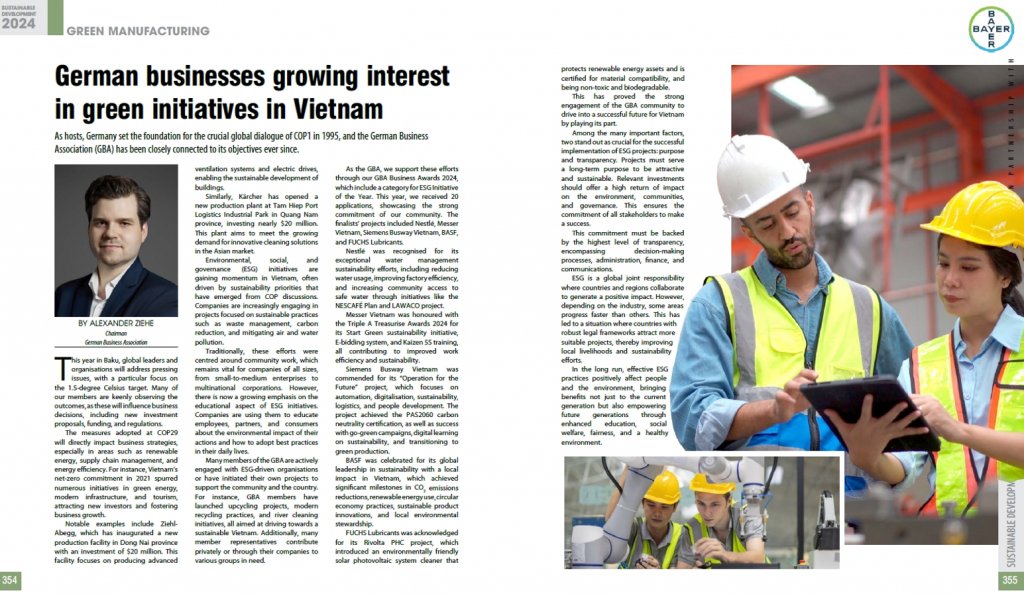As hosts, Germany set the foundation for the crucial global dialogue of COP1 in 1995, and the German Business Association (GBA) has been closely connected to its objectives ever since.

This year in Baku, global leaders and organisations will address pressing issues, with a particular focus on the 1.5-degree Celsius target. Many of our members are keenly observing the outcomes, as these will influence business decisions, including new investment proposals, funding, and regulations.
The measures adopted at COP29 will directly impact business strategies, especially in areas such as renewable energy, supply chain management, and energy efficiency. For instance, Vietnam’s net-zero commitment in 2021 spurred numerous initiatives in green energy, modern infrastructure, and tourism, attracting new investors and fostering business growth.
Notable examples include Ziehl-Abegg, which has inaugurated a new production facility in Dong Nai province with an investment of $20 million. This facility focuses on producing advanced ventilation systems and electric drives, enabling the sustainable development of buildings.
Similarly, Kärcher has opened a new production plant at Tam Hiep Port Logistics Industrial Park in Quang Nam province, investing nearly $20 million. This plant aims to meet the growing demand for innovative cleaning solutions in the Asian market.
Environmental, social, and governance (ESG) initiatives are gaining momentum in Vietnam, often driven by sustainability priorities that have emerged from COP discussions. Companies are increasingly engaging in projects focused on sustainable practices such as waste management, carbon reduction, and mitigating air and water pollution.
Traditionally, these efforts were centred around community work, which remains vital for companies of all sizes, from small-to-medium enterprises to multinational corporations. However, there is now a growing emphasis on the educational aspect of ESG initiatives. Companies are using them to educate employees, partners, and consumers about the environmental impact of their actions and how to adopt best practices in their daily lives.
Many members of the GBA are actively engaged with ESG-driven organisations or have initiated their own projects to support the community and the country. For instance, GBA members have launched upcycling projects, modern recycling practices, and river cleaning initiatives, all aimed at driving towards a sustainable Vietnam. Additionally, many member representatives contribute privately or through their companies to various groups in need.
As the GBA, we support these efforts through our GBA Business Awards 2024, which include a category for ESG Initiative of the Year. This year, we received 20 applications, showcasing the strong commitment of our community. The finalists’ projects included Nestlé, Messer Vietnam, Siemens Busway Vietnam, BASF, and FUCHS Lubricants.
- Nestlé was recognised for its exceptional water management sustainability efforts, including reducing water usage, improving factory efficiency, and increasing community access to safe water through initiatives like the NESCAFÉ Plan and LAWACO project.
- Messer Vietnam was honoured with the Triple A Treasurise Awards 2024 for its Start Green sustainability initiative, E-bidding system, and Kaizen 5S training, all contributing to improved work efficiency and sustainability.
- Siemens Busway Vietnam was commended for its “Operation for the Future” project, which focuses on automation, digitalisation, sustainability, logistics, and people development. The
project achieved the PAS2060 carbon neutrality certification, as well as success with go-green campaigns, digital learning on sustainability, and transitioning to green production. - BASF was celebrated for its global leadership in sustainability with a local impact in Vietnam, which achieved significant milestones in CO2 emissions reductions, renewable energy use, circular economy practices, sustainable product innovations, and local environmental stewardship.
- FUCHS Lubricants was acknowledged for its Rivolta PHC project, which introduced an environmentally friendly solar photovoltaic system cleaner that protects renewable energy assets and is certified for material compatibility, and being non-toxic and biodegradable.
This has proved the strong engagement of the GBA community to drive into a successful future for Vietnam by playing its part. Among the many important factors, two stand out as crucial for the successful implementation of ESG projects: purpose and transparency. Projects must serve a long-term purpose to be attractive and sustainable. Relevant investments should offer a high return of impact on the environment, communities, and governance.
This ensures the commitment of all stakeholders to make a success. This commitment must be backed by the highest level of transparency, encompassing decision-making processes, administration, finance, and communications. ESG is a global joint responsibility where countries and regions collaborate to generate a positive impact. However, depending on the industry, some areas progress faster than others. This has led to a situation where countries with robust legal frameworks attract more suitable projects, thereby improving local livelihoods and sustainability efforts.
In the long run, effective ESG practices positively affect people and the environment, bringing benefits not just to the current generation but also empowering future generations through enhanced education, social welfare, fairness, and a healthy environment.
Click here>>> for the Vietnamese article.
